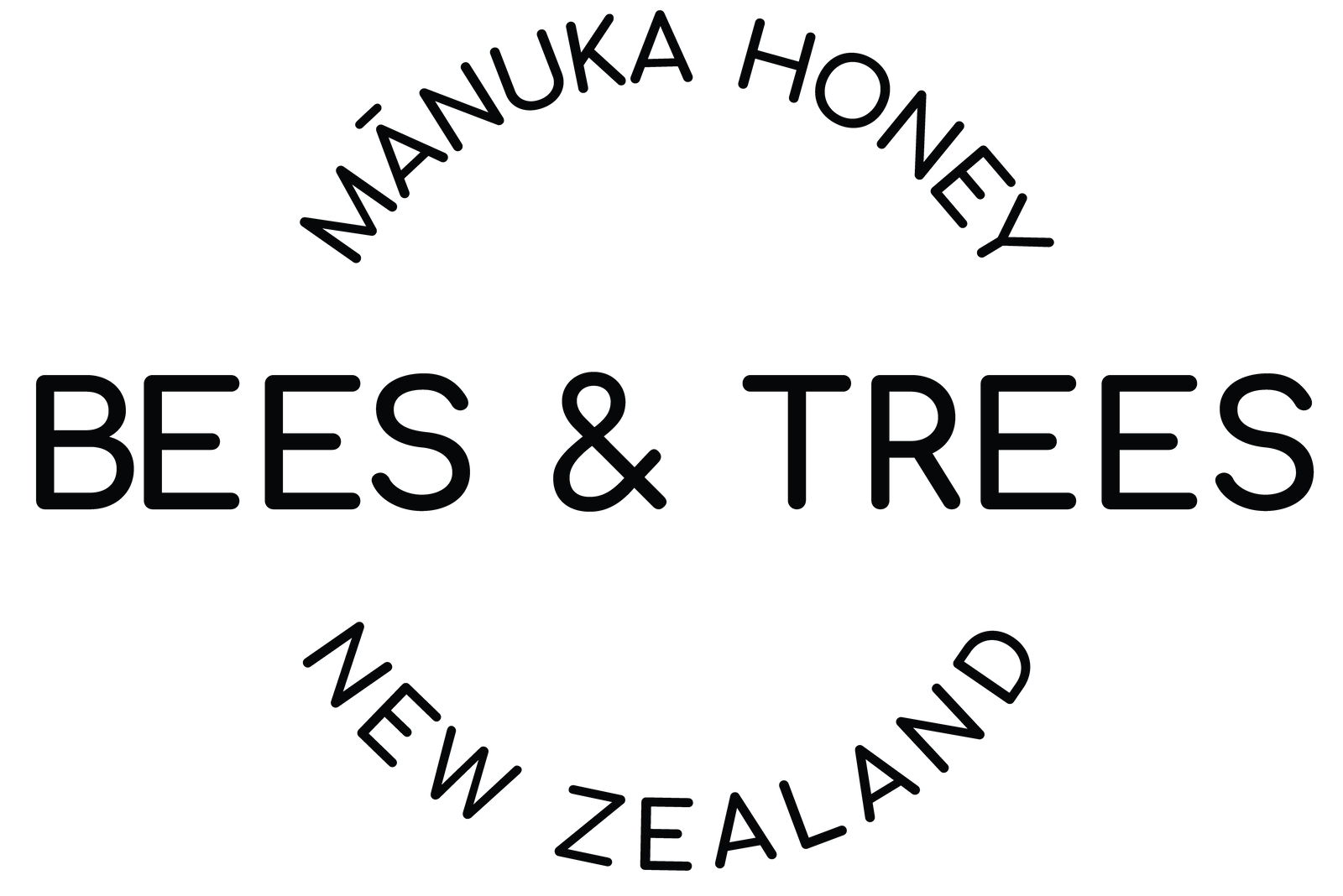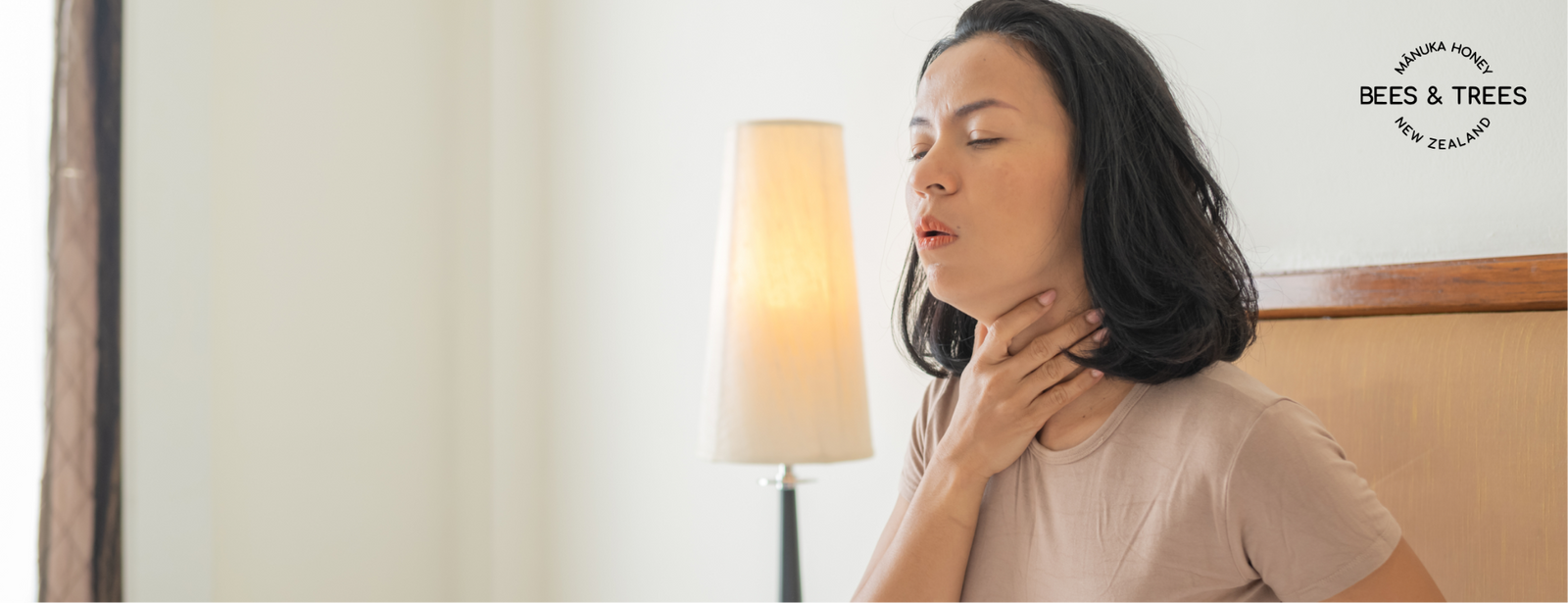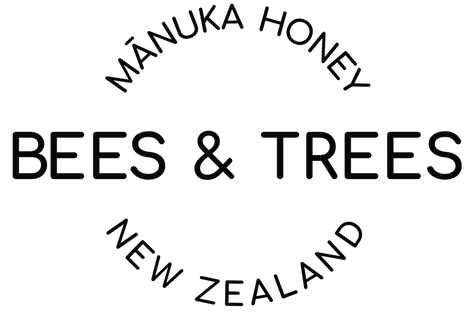Honey is a popular food that can be traced back to 8,000 years ago. [1] It was traditionally used by Greeks, Egyptians, Chinese, and Romans as a wound-healing agent and a cure for diseases like gastric ulcers. Honey is also famous as a cough, sore throat, and earache remedy. [2]
However, as popular as honey is, there are other bee products that have been a part of human evolution and have been used for thousands of years. Did you know that in ancient Egypt, beeswax and propolis were used to prepare the dead? Like famous Egyptian mummies. [3] In this article, we’ll discuss everything you need to know about propolis, including what it is, its benefits, and its presence in honey.
What is Manuka Honey?

Before we delve into propolis, we’d like to lay some groundwork that will inform our discussion in later sections. So, what is Manuka honey, and where does it come from? Manuka honey is honey that is created by bees that primarily forage on nectar from the flowering Manuka tree, which is indigenous to New Zealand. The word “Manuka” was coined by Polynesian voyagers (Maori) after discovering the plant on the islands they called Aotearoa. [3]
Manuka honey contains a unique, organic compound called methylglyoxal that is formed through the non-enzymatic conversion of dihydroxyacetone (DHA) which is available in Manuka flower nectar. Methylglyoxal directly correlates to Manuka honey’s strong antibacterial properties. The higher the methylglyoxal concentration, the more potent the antibacterial activity. [4]
What is Propolis?

Propolis, also known as “bee glue,” is the resin-like dark brown substance that is collected by bees from shrubs, sap flow, and tree buds. “Propolis” is derived from a Greek word. “Pro” means defense, and “polis” stands for city or community, and in this case, the beehive. [5] It is the third most essential bee product in the world and is composed of “resin (50%), wax (30%), essential oils (10%), pollen (5%), and other organic compounds (5%).” [5]
As you may infer from its name, propolis is used by bees to protect the beehive. It usually hardens the cell wall, functioning as a sealant, and is used by bees to repair and reconstruct holes and cracks in the beehive. [5] Propolis is also used to smooth the beehive’s inner surface in order to maintain an average temperature of 35°C. It is also used to prevent predator invasion and weathering. [5] Propolis is antibiotic in nature and contributes to an aseptic internal environment. It is also used as a means of self-medication by bees. [3] In order to be effective, propolis has to be shielded from high temperatures. When exposed to heat, it decomposes and becomes soft and sticky. [5]
Propolis is rich in macro and micronutrients. It contains “phenolic compounds, esters, flavonoids, terpenes, beta-steroids, aromatic aldehydes, and alcohols.” [6] The main flavonoids in propolis are “pinocembrin, acacetin, chrysin, rutin, luteolin, kaempferol, apigenin, myricetin, catechin, naringenin, galangin, and quercetin.” Propolis also contains caffeic acid, cinnamic acid (phenolic acids), and resveratrol. [7]
Propolis is also rich in vitamins like “vitamins B1, B2, B6, C, and E and useful minerals such as magnesium (Mg), calcium (Ca), potassium (K), sodium (Na), copper (Cu), zinc (Zn), manganese (Mn), and iron (Fe).” It also contains enzymes like “succinic dehydrogenase, glucose-6-phosphatase, adenosine triphosphatase, and acid phosphatase.” [5]
Benefits of Propolis

- Gastrointestinal Benefits
In a 2006 study, researchers investigated the in vitro effects of propolis on Giardia duodenalis trophozoites and found that propolis inhibited the growth of the trophozoites. It was also shown to promote the detachment of Giardia duodenalis trophozoites. A clinical study where subjects with giardiasis were given propolis reported a “cure rate between 52% and 60%, whereas those given the conventional drug showed a 40% cure rate.” [8] Additionally, propolis contains antiulcerogenic and anti-inflammatory properties, which might be beneficial in treating gastric ulceration. [9]
- Gynecological Benefits
In a 2005 study investigating the effectiveness of propolis solution as a potential treatment for chronic vaginitis, researchers concluded that propolis had a positive effect on the improvement of vaginal well-being. [10] In a 2015 study, propolis was shown to be an efficient fungicide. It also showed anti-biofilm activity, making it a viable potential alternative treatment for Vaginal Candida albicans. [11]
- Oral Health Benefits
Propolis has antibacterial properties that might be effective in restricting the development of bacterial plaque and periodontitis.[12] [13] Propolis extract can also be used as a mouth rinse to eliminate streptococcus mutants in the oral cavity. According to a 2014 review article, propolis is used in dental care. It has “ been used in dentifrices, as a storage medium for teeth that have avulsed, in periodontal therapy and in endodontic treatment.” [14] Propolis solution can also be used as a toothbrush disinfectant and cure for halitosis. [15] [5]
- Antitumor Activity
In a 2014 study investigating the antitumor activity of Chinese propolis in human breast cancer MCF-7 and MDA-MB-231 cells, researchers concluded that the ethanol extract of Chinese propolis demonstrated antitumor properties and might be a potential treatment alternative for breast cancer. [16] In another 2016 study, results showed that Turkish propolis might be able to reduce the proliferation of cancer cells. [17]
- Skin Care Benefits
Honey is a popular skincare routine element and is normally used to make DIY facial masks and as an ingredient in beauty products. However, it’s not the only bee product that is beneficial for facial care. According to a 2015 study, propolis contains anti-inflammatory and antibacterial properties, which are effective in the treatment of acne vulgaris. Propolis is also reportedly effective against “gram-positive aerobic (Staphylococcus epidermidis) and gram-positive anaerobic bacteria (Propionibacterium acnes).” [18]
Propolis is also great for wound healing as it modifies fibronectin metabolism and increases collagen in the tissue. [19] In a 2014 controlled clinical trial, patients with diabetic foot ulcers had propolis applied for a period of six weeks. At the end of the trial, researchers concluded that propolis displayed wound-healing capabilities that might be effective when applied weekly. [20]
Honey and Propolis

Does honey contain propolis? And more specifically, does Manuka honey contain propolis? It’s safe to say that some kinds of honey contain some traces of propolis, but this depends on post-harvest processing. It all comes down to the amount of heat and type of filter used when packaging honey. Raw honey subject to less processing and minimal filtering may contain more traces of propolis. More heavily processed honey, on the other hand, may not contain the same amount of propolis due to heating, pasteurization, and finer filtering.
In order to enjoy the benefits of propolis, we recommend going for raw honey or minimally processed honey. Avoid pasteurized honey, as heat destroys propolis. If you are not entirely sure if the honey you are purchasing contains propolis, you can buy propolis as a standalone product.
Bees & Trees Manuka Honey

Bees and Trees Manuka honey is minimally processed and may contain small traces of propolis. We use a small batch harvesting system to ensure the quality of each jar of honey. Additionally, we test all our honey and publish the test results on our product pages to ensure authenticity and transparency to our customers. Try Bees and Trees premium Manuka honey today.
References:
- Traditional and Modern Uses of Natural Honey in Human Diseases: A Review - PMC https://www.ncbi.nlm.nih.gov/pmc/articles/PMC3758027/#:~:text=of%20natural%20honey-,Human%20use%20of%20honey%20is%20traced%20to%20some%208000%20years,of%20the%20gut%20(12).
- Biological and therapeutic effects of honey produced by honey bees and stingless bees: a comparative review - ScienceDirect https://www.sciencedirect.com/science/article/pii/S0102695X16301843?via%3Dihub
- Eaton, V. C. (2016). In Manuka: The biography of an extraordinary honey. essay, Exisle Publishing.
- The origin of methylglyoxal in New Zealand manuka (Leptospermum scoparium) honey https://pubmed.ncbi.nlm.nih.gov/19368902/
- Honey, Propolis, and Royal Jelly: A Comprehensive Review of Their Biological Actions and Health Benefits - PMC https://www.ncbi.nlm.nih.gov/pmc/articles/PMC5549483/
- Recent advances in the chemical composition of propolis https://pubmed.ncbi.nlm.nih.gov/25432012/
- Separation of flavonoids and phenolic acids from propolis by capillary zone electrophoresis https://pubmed.ncbi.nlm.nih.gov/15213987/
- In vitro effects of propolis on Giardia duodenalis trophozoites https://pubmed.ncbi.nlm.nih.gov/16428024/
- Antiulcerogenic Effect of Brazilian Propolis Formulation in Mice https://www.scirp.org/html/5-2500695_62442.htm
- Propolis solution for the treatment of chronic vaginitis https://pubmed.ncbi.nlm.nih.gov/15847875/
- Propolis Is an Efficient Fungicide and Inhibitor of Biofilm Production by Vaginal Candida albicans https://pubmed.ncbi.nlm.nih.gov/25815029/
- Clinical Evidence of the Efficacy of a Mouthwash Containing Propolis for the Control of Plaque and Gingivitis: A Phase II Study https://pubmed.ncbi.nlm.nih.gov/21584253/
- Influence of the toothpaste with brazilian ethanol extract propolis on the oral cavity health https://pubmed.ncbi.nlm.nih.gov/23861699/
- PROPOLIS IN ORAL HEALTH: A NATURAL REMEDY | World Journal of Pharmaceutical Sciences https://wjpsonline.com/index.php/wjps/article/view/propolis-oral-health-natural-remedy
- Antimicrobial capacity of Aloe vera and propolis dentifrice against Streptococcus mutans strains in toothbrushes: an in vitro study https://pubmed.ncbi.nlm.nih.gov/22437675/
- Antitumor Activity of Chinese Propolis in Human Breast Cancer MCF-7 and MDA-MB-231 Cells https://pubmed.ncbi.nlm.nih.gov/24963320/
- Antiproliferative and proapoptotic activity of Turkish propolis on human lung cancer cell line https://pubmed.ncbi.nlm.nih.gov/26700423/
- Significance of topical propolis in the treatment of facial acne vulgaris Mohammad Ali BM, Ghoname NF, Hodeib AA, Elbadawy MA https://www.ejdv.eg.net/article.asp?issn=1110-6530;year=2015;volume=35;issue=1;spage=29;epage=36;aulast=Mohammad
- Propolis modulates fibronectin expression in the matrix of thermal injury https://pubmed.ncbi.nlm.nih.gov/24738072/
- Topical application of the bee hive protectant propolis is well tolerated and improves human diabetic foot ulcer healing in a prospective feasibility study https://pubmed.ncbi.nlm.nih.gov/25239451/







